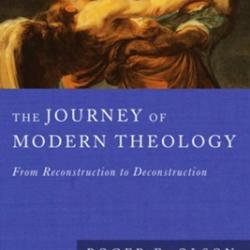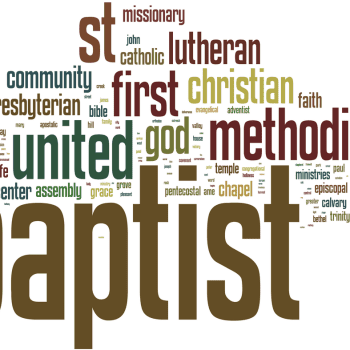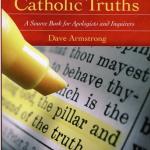Can Prayer Change God? (Yes and No)
If I were to write another book about Christian clichés (folk religion) I would include a chapter on this very popular one: “Prayer doesn’t change things; it changes me.” Or sometimes it goes like this: “Prayer doesn’t change God; prayer changes me.” Over the years, but very often recently, I have seen or heard this cliché—in sermons, on Facebook, in casual conversations. It has become a kind of stock cliché that rarely receives any pushback or criticism. Most people who hear it nod their heads solemnly as if it’s obviously true.
But there’s a problem with this cliché. The Bible is full of examples of prayer changing things and even God! No, not changing God in his nature or character, but changing God’s plan and bringing it about, because someone prays, that God does something he would not otherwise do. Jesus seemed to teach this about prayer in some of his parables.
So where does this idea, expressed in this common folk cliché, come from? Well, I don’t know. Like most popular clichés its origin seems to be lost. I will say, however, that it is completely consistent with the theology of Friedrich Schleiermacher who, his great systematic theology The Christian Faith, argued that petitionary prayer is an immature form of prayer because it implies a dependence of God on us and the essence of religion is our dependence on God.
Schleiermacher was a divine determinist. He was also the “father” of modern, liberal Protestant theology. Most liberal Protestant theologians followed Schleiermacher’s view of prayer, even if not his view of God’s absolute, deterministic sovereignty. Most liberal Protestant theologians were and are naturalists in their view of finite reality; the universe is a closed causal network and miracles and divine interventions do not happen—except in the inner spiritual life of an individual or a group of people.
*Sidebar: The opinions expressed here are my own (or those of the guest writer); I do not speak for any other person, group or organization; nor do I imply that the opinions expressed here reflect those of any other person, group or organization unless I say so specifically. Before commenting read the entire post and the “Note to commenters” at its end.*
If Schleiermacher was the most influential 19th century Protestant theologian, Karl Barth was without doubt the most influential 20th century Protestant theologian. Someone recently sent me this quote from Barth:
“The fact that God yields to human petitions, that he alters his intentions and follows the bent of our prayers, is not a sign of weakness. In his own majesty and in the splendor of his might, he has willed and yet wills it so. He desires to be the God who has been made flesh in Jesus Christ. Therein lies his glory, his omnipotence. He does not then impair himself by yielding to our prayer; on the contrary, it is in so doing that he shows his greatness.
If God himself wishes to enter into fellowship with humankind and be close to us as a father is to his child, he does not thereby weaken his might. God cannot be greater than he is in Jesus Christ.” (Prayer, Westminster John Knox Press, 2002)
Barth’s view is the more traditional one; for many centuries—back into “Bible times”—God’s people have believed in the efficacy of prayer as well as the sovereignty of God. Of course prayer is not magic; it does not manipulate God. But prayer has always been believed to have the power, because God grants it, to “move” God to act.
The great irony is that the cliché “Prayer doesn’t change God; prayer changes me” is most often repeated and received uncritically within conservative, even evangelical, Christian circles. Why?
I suspect the popularity of this cliché has something to do with 1) the popularity of Calvinism in American Christianity, and 2) the desire not to have to explain why petitionary prayer doesn’t always “work.” Calvinism’s divine determinism ultimately makes petitionary prayer impotent; many Christians do not want to wrestle with the problem of unanswered prayer.
Yet, ultimately, the cliché is unbiblical; Jesus himself encouraged petitionary prayer and even strongly suggested that sometimes petitionary prayer only “works” when it is passionate and persistent.
I want to call on all biblically-committed Christians to resist the clichés “Prayer doesn’t change things; prayer changes me” and even “Prayer doesn’t change God; prayer changes me.” Prayer does both—when God permits it.
*Note to commenters: This blog is not a discussion board; please respond with a question or comment only to me. If you do not share my evangelical Christian perspective (very broadly defined), feel free to ask a question for clarification, but know that this is not a space for debating incommensurate perspectives/worldviews. In any case, know that there is no guarantee that your question or comment will be posted by the moderator or answered by the writer. If you hope for your question or comment to appear here and be answered or responded to, make sure it is civil, respectful, and “on topic.” Do not comment if you have not read the entire post and do not misrepresent what it says. Keep any comment (including questions) to minimal length; do not post essays, sermons or testimonies here. Do not post links to internet sites here. This is a space for expressions of the blogger’s (or guest writers’) opinions and constructive dialogue among evangelical Christians (very broadly defined).
















